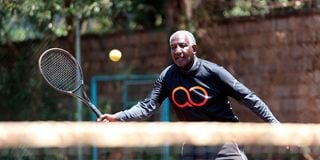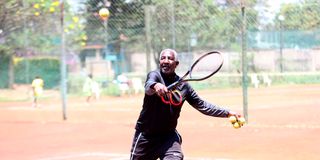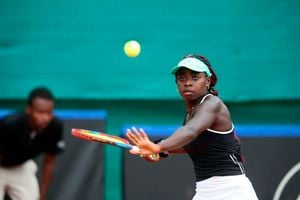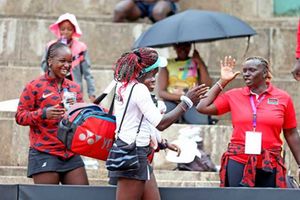
Tennis coach Peter Wachira hits a forehand shot during a tennis training session at the Public Service Club on October 30, 2024.
It has been a long walk in tennis for Peter Wachira, regarded as the father of coaching and umpiring the game in Kenya.
Famously known as “Coach Wach”, the 69-year-old has been involved in the racquet sport for 51 years now, and counting.
He has chalked up 30 years as a professional tennis coach and contributed immensely to the development of coaches and umpires in Kenya.
Wachira’s notable former students include top national team coaches Rosemary Owino and George Oyoo, renowned international referee Patrick Kamuhia and Tennis Kenya Secretary General Wanjiru Mbugua-Karani who is also the Eastern Africa (Zone IV) president and one of the five vice presidents of Confederation of African Tennis (CAT).
“Basically, almost every senior coach in the country at the moment has gone through Wachira’s guidance and mentorship at one point or another,” said former Kenya Fed Cup and Davis Cup captain Owino.
Last year, Tennis Kenya held a surprise party to celebrate Wachira’s 50 years in tennis. He was honoured with a lifetime achievement by TK president James Kenani.
Born in Nanyuki, Laikipia on November 1, 1954, Wachira, who is also the Tennis Kenya County Liaison, says his association with tennis started in 1972.
His dad was transferred to Nakuru in 1960 where Wachira schooled, at St Paul’s Primary School near Menengai Social Hall before joining Menengai High School where one of his teachers, Hepple Susan, a Peace Corps volunteer from the USA, introduced him to tennis.
“But generally, there were tennis courts at Nakuru Athletics Club. My mum Teresia Mumbi and I used Racecourse Road to go to the garden near Nakuru GK Prison. I would stop and peep through the Nakuru Athletic Club fence and ask myself this question ‘Why are all these old women running with a tennis ball?’”
He says that tennis balls were very famous in Nakuru at that time. “Instead of playing tennis, all the kids used to play football with the tennis balls. My interest in tennis grew from peeping through the Nakuru Athletic Club fence. Little did I know that in later years of my life, that would become my life,” observes Wachira.
He does admit that he also tried out football, basketball, hockey and distance running, but tennis “had a special place in my heart”.

Tennis coach Peter Wachira hits a forehand shot during a tennis training session at the Public Service Club on October 30, 2024.
The first-born in a family of five, he cleared high school in 1973 and then went to Nairobi in search of a job.
“I was employed as a cleaner by the Kenya Brewers and joined their tennis team. That was in 1974,” recalls Wachira.
It happened rather fortuitously.
One day the Breweries tennis team had a fixture in the Kenya Circuit Men’s ATP league and didn’t have a sixth player to complete the team.
“They asked me to join in and become that sixth player. It was very interesting because out of the six matches that I played, I won five. So they said, ‘wait, you know how to play tennis’? I replied, ‘yes, I know a bit of tennis’. And that’s how I joined the team,” says Wachira.
He could play tennis anytime at Breweries “because coaches and rackets were there, so there was nothing for me to struggle”.
It was not long before he found himself coaching tennis. Stephen Kasigwa got him into coaching in early 1982.
“Kasigwa was a Ugandan player based here in Kenya. He was very talented. One day he said he had too many assignments because he was still actively involved in playing tennis. He got all the men and the ladies at the club and did a trial to see if we could be able to help him to coach the team. The mantle fell on me as Kasigwa said I’d be his assistant,” explains Wachira.
KLTA then invited coach Paul Douglas from the Lawn Tennis Association of England to run a training course for coaches in East Africa at the Nairobi Club in March 1982.
“I was the only African person from Kenya who was in that course. The others were whites and Asians. I qualified as an elementary level coach. KLTA under chairman David Mutua took me in and I became one of the guys who would be assisting a coach assigned to the national team.”
In 1985 he was appointed Kenya's coach for the Indian Ocean Championships to Madagascar and Reunion
“And from there, I have never stopped coaching,” says Wach, Kenya’s first black certified tennis coach and umpire.
Wachira left Breweries in 1995 to pursue full-time coaching. He was by then a laboratory technician.
“I have seen a lot of growth in tennis. I had to develop the skills because I realized that I was the only one helping the African kids. And when I talked to the federation, I asked them that I needed to get more coaches so that I can be able to reach out to the whole nation because I couldn’t do that alone.”
Wachira says that in 1995 he was the only indigenous Kenyan tennis coach.
He wrote a coaching booklet with level I, II and III syllabuses and got the blessings of the federation to use it to train coaches.
He conducted coaching courses in Nairobi, Mombasa and Kisumu. And as they continued to spread the game, Wachira says ITF started an education programme for coaching coaches in the country.
“I did my ITF level I and passed. Then in 1999, I did level II. In fact 25 of us did the course and only two of us passed - me and Ng’ang’a Karenge,” says the father of four.
Wachira asserts that Kenya has made great strides in developing tennis.
“As late as the 1980s Nairobi Club was out of bounds for African kids. There was a sign that read ‘Africans and dogs are not allowed on the tennis courts here’. I had to fight with the members of the club to allow even the workers’ kids to come and play tennis,” Wachira reveals.
He also went back to Breweries and got some children from the junior football team and trained them tennis.
“The white people there were shocked. They said, hey, who is this coaching kid that we don’t know and we have never heard about him? And that’s how we broke it to them and then, Breweries embraced what I was doing,” says Wachira. They would use the Breweries tennis courts at Ruaraka for training.
“Most of the players I took from football have grown now. They have become tennis coaches. I’ve seen them grow. And from there, I was nominated as a County coach. So, wherever Tennis Kenya want to start coaching tennis, I’m the person who goes to the counties,” says Wachira, who has been to Garissa, Embu, Vihiga, Thika, Makueni, Kakamega, Homa Bay, Meru, Kisumu and Machakos among other places to start tennis.
“The only unfortunate thing is that we don’t have our own ground. We depend on private clubs.
“We sometimes have restrictions on what you can do and how you can assist the kids to come. But all in all, when I was a junior development tennis coordinator, I had 10 schools in Nairobi where I would coach the students' tennis.”
Wachira has been involved in African Games since 1999 when he was named as Team Kenya tennis coach.
“All the reports we write about having tennis facilities, I think go to deaf ears. The government has never built a single public tennis court. They gave Tennis Kenya 10 acres at Moi International Sports Centre, but the project of constructing a National Tennis Centre has never taken off.
Umpiring
So, I think we can do better to get there,” says Wachira, who feels the government is biased towards football and athletics.
What about umpiring?
Since there were no qualified umpires in Kenya when he started tennis, Wachira self-trained himself, and was ready to show his worth when the chance came.
“In 1979, I was asked to umpire a match. I performed so well that KLTA immediately enrolled me as one of their umpires, to officiate matches in Kenya.
“Actually, it was only me and another guy from the Central Bank of Kenya called Paul Kanyi. And then we had some other guys from Ghana,” says Wachira.
“I am also the person who introduced officiating tennis in Kenya. There was nobody else. So, I did both coaching and officiating. And I went up to Level II in officiating.”
As a pioneer in officiating and coaching tennis in Kenya, Wachira says it felt good, but then there was the pressure.
“I was the only one and I could not cover the whole nation. I realized the only option for me was to train others.
“Now we have got badge referees, so many White Badge referees and umpires here in Kenya,” says Wachira.
Top umpires Moses Kimani and Sammy Kipkoech and coaches Caroline Oduor, Francis Rogoi, Lawrence Karanja and Peter Rakuom, just to name a few, all passed through Wachira.
He has also been involved in wheelchair tennis as a coach for the last five years and gone twice to the World Championships with the Kenya team.
“I think tennis, I walk tennis, I drink tennis, I sleep tennis,” the sexagenarian simply says.
He served in Tennis Kenya as a council member from 1985 to 2012, during John Warambo’s last term as the KLTA chairman.
He was the tennis coach for Team Kenya at three African Games – 1999 Johannesburg, 2015 Brazzaville ) and 2019 Rabat.
Indeed, tennis is his life.









